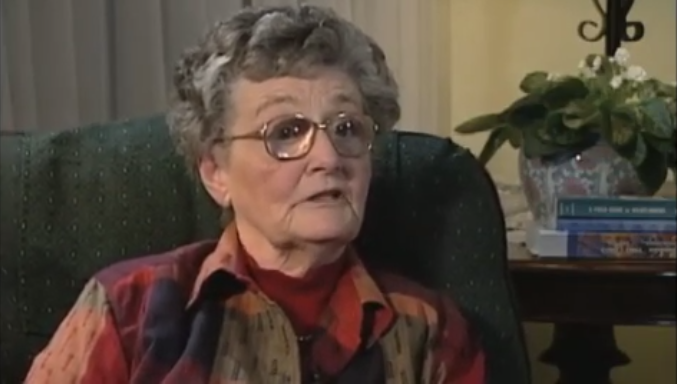The Advantageous and Ill Effects of Working for Intelligence Service
Heroes Remember
The Advantageous and Ill Effects of Working for Intelligence Service
Transcript
One of the things we did were visit the, where daily visits were
made to the American and the, and the Russian and the British
Embassies. Those were regular visits that were made. The,
although Russia was supposedly our friend, we were, you know it
was, we were always on the lookout
as to what was happening there.
The Air Force Intelligence, we were a close-knit group, well, I
can't say that we were very demonstrative though, the fact that
we were close-knit. But they, I know when my brother was
drowned, my brother was drowned in 1945
trying to save another man. He was 16.
They took up a collection for me to go home and, and they were
very supportive of me afterwards. They didn't, they made sure
that, you know, that I was taken out to Murray's Restaurant for
lunch once in a while. Murray's Restaurant was just down the
corner from where we worked, and, but Murray's Restaurant was,
you never saw a man in there, hardly ever. It was a women's
restaurant. Men were gone, all the civil service people were
women. But the odd time, at lunch time, you'd see men, but
never at night. It was, but, no, and they were very good to, you
know, very good that way. We were close and, but we were told
to never, the majority of us lived, if we had homes nearby, or
lived off-base, but we never went home ‘til after the late news,
some of us. Were told the ones of us, you know, sometimes we
were told by our boss not to, in case we would spill the news,
Matthew Halton reported the news. He was the war correspondent.
His reports from overseas were accurate
to what we had on the table, which was top secret.
If he said, "They took, the Canadians took a hill today," or,
or, or, you know, or, "smashed so many German tanks," or
"invaded a church," or whatever, or, "somewhere in Holland," or,
"somewhere in France," he'd never give the location, but he
would say, "Somewhere in." But he was right on target.
Interviewer: You had already all that information?
I had that information, but that's why we weren't allowed to be
anywhere when news was being broadcast. Because we could, you
know, just human nature would sometimes rise to the fore and
you'd just spill the beans and you weren't supposed to.
It was an interesting experience, although, the one thing,
though, that it does do to you is that when you work with people
that are questioning other people and questioning why things are
being done, and you know that you're, intelligence is all
questions, a lot of questioning, it sort of spoils your life
because you sum up people rather quickly, I think. I think it,
it makes you come to a conclusion faster than you would
normally. I don't know if it's good insight that I, as far as
I'm concerned, but I do know that, that, I mean, you ask a lot
of questions and I think luckily my husband was a military
person so I could be curt and, you know, ask questions and get
away with it. And he would understand, and, and I think, too,
that it spoils your social life. I think for that, maybe I'm
wrong in that. Maybe it just affected me that way,
I don't know, but.
At the time, I, I mean I had, I mean he, my husband-to-be, later
on, was there through all the conflict, the Normandy, the
European Campaign, and I knew every step he was taking.
If you didn't hear that he was dead, you knew he didn't die and
that you would get the reports that, you know, I mean the
families would have the reports that he had died, they had died,
so you would hear through the families that they had, that news
soon spreads. But, but you knew they were in conflict
and it wasn't an easy conflict so.
Interviewer: So you could follow his every step?
Yeah, that's right, yep.
Description
Knowing where her soldier husband to be was throughout the war was a good thing but keeping secrecy was something else...
Christina Janet Grégoire
Mrs. Grégoire was born in Campbellton, New Brunswick, on March 1, 1925, and grew up in Sillarsville, Québec. In March 1943, when she was 18, she joined the Air Force in Montréal. After training at Rockcliffe and a first posting in Scoudouc she was given a Top Secret rating by the RCMP before being assigned to the Air Force Headquarters Intelligence Directorate in Ottawa. She was discharged after VJ Day and released in November 1945. She now gives workshops for the United Church and is involved in volunteering in various Hospital Veterans' Wards.
Meta Data
- Medium:
- Video
- Owner:
- Veterans Affairs Canada
- Duration:
- 04:56
- Person Interviewed:
- Christina Janet Grégoire
- War, Conflict or Mission:
- Second World War
- Location/Theatre:
- Canada
- Branch:
- Air Force
- Units/Ship:
- Air Force Headquarters, Directorate of Intelligence (Ottawa)
- Occupation:
- Clerical work
Related Videos
- Date modified:




